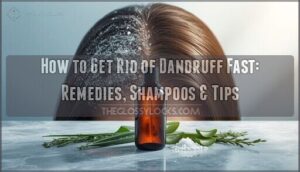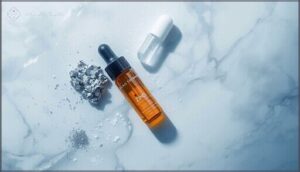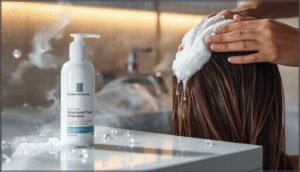This site is supported by our readers. We may earn a commission, at no cost to you, if you purchase through links.
Half the population experiences dandruff at some point, yet most people suffer through it longer than they need to. That’s not bad luck—it’s usually the wrong approach.
Dandruff isn’t a hygiene problem. It’s a fungal one, driven by a yeast called Malassezia that lives on every scalp but sometimes grows out of control.
The good news: once you know what you’re actually fighting, getting rid of it fast becomes straightforward. The right shampoo, the right technique, and a few targeted remedies can clear visible flakes within days.
Table Of Contents
- Key Takeaways
- How to Get Rid of Dandruff Fast
- Top Medicated Shampoos for Fast Relief
- Effective Home Remedies for Dandruff
- Preventing Dandruff Flare-Ups
- When to Seek Medical Help for Dandruff
- Frequently Asked Questions (FAQs)
- How to clear dandruff overnight?
- How can I avoid dandruff?
- How to get rid of dandruff using diet changes?
- How do I get rid of dandruff?
- What can I do if dandruff doesn’t work after 2 weeks?
- How can I get rid of dandruff fast?
- What kills dandruff?
- How to get rid of dandruff naturally?
- Can dandruff go away on its own?
- How do you get rid of dandruff asap?
- Conclusion
Key Takeaways
- Dandruff isn’t a hygiene issue — it’s driven by a yeast called Malassezia, so antifungal shampoos with zinc pyrithione or ketoconazole treat the actual cause, not just the symptoms.
- Leave your medicated shampoo on for 3–5 minutes and use it 2–3 times a week for at least two weeks — contact time and consistency are what make it work.
- Home remedies like coconut oil mixed with tea tree oil or an apple cider vinegar rinse (1 part vinegar, 4 parts water) can reduce flaking between washes, but they support treatment rather than replace it.
- If flakes spread to your eyebrows or ears, or don’t improve after two weeks of consistent treatment, see a dermatologist — you may be dealing with seborrheic dermatitis, which needs prescription-strength care.
How to Get Rid of Dandruff Fast
Dandruff doesn’t wait for a convenient time to show up, and neither should your fix. Whether you’ve got a big day ahead or just hit your limit with the flakes, there are real steps you can take right now. Here’s where to start.
Understanding what’s actually triggering your flakes makes all the difference, so it’s worth checking out this breakdown of common dandruff causes and remedies before you reach for any product.
Step-by-Step Quick Fixes
Take control of dandruff with three targeted steps:
- Shampoo Application: Apply an antidandruff shampoo with zinc pyrithione to your scalp and leave it on for 5 minutes before rinsing — active ingredients need time to work.
- Scalp Massage: Use circular fingertip motions for 3–5 minutes to lift flaking and spread the product evenly.
- Tea Tree Prep: Add 5–10 drops of tea tree oil to your shampoo to reduce itching fast.
Immediate Flake Reduction Methods
Once your antidandruff shampoo is working, don’t stop there. Scalp exfoliation once or twice a week clears dead skin so treatments absorb better.
Follow up with gentle combing — smooth, rounded teeth lift loose flakes without irritating your scalp.
Dry shampoo buys you time between washes by absorbing oil fast.
A lightweight leave-in scalp treatment keeps itching and flaking controlled all day.
Overnight Home Remedies
While daytime fixes manage flakes on the surface, overnight home remedies go deeper. Warm coconut oil — 2 to 3 tablespoons — works as a scalp treatment that loosens flakes while you sleep. For stronger oil treatment benefits, mix in 3 to 5 drops of tea tree dilution per tablespoon.
Aloe vera masks calm redness overnight. Skip vinegar timing past 15 minutes — it’s too harsh to leave on.
Top Medicated Shampoos for Fast Relief
When dandruff is stubborn, the right shampoo can make a real difference fast. The active ingredient is what matters most — not the brand or the price tag.
Here’s what to look for and how to use it.
Key Active Ingredients (Zinc, Selenium, Ketoconazole)
Not all dandruff shampoos work the same way. Pyrithione zinc slows yeast growth and eases flaking within a few washes. Selenium sulfide controls cell turnover and oiliness, making it a solid antifungal pick for heavy shedding. Ketoconazole hits hardest — the 2% prescription strength can cut dandruff severity by around 70% in four weeks.
If you’re still hunting for the right formula, this guide to top-rated shampoos for itchy, flaky scalps breaks down which active ingredients actually deliver results.
Ketoconazole hits hardest, cutting dandruff severity by around 70% in just four weeks
Each ingredient targets a different angle of the same problem.
How to Use Medicated Shampoos Effectively
Getting the most out of a medicated dandruff shampoo comes down to how you apply it — not just how often. Follow these steps:
- Massage it into your scalp for 30 seconds, then leave it on 3–5 minutes.
- Stick to 2–3 times weekly — shampoo rotation with a gentle formula prevents dryness.
- Stay consistent for at least 2–4 weeks so ketoconazole, pyrithione zinc, or selenium sulfide can fully work.
Prescription Vs. Over-the-Counter Options
Most mild cases respond well to over-the-counter alternatives like 1% ketoconazole or zinc pyrithione shampoos — you can grab these without a doctor’s visit and see results within one to two weeks.
But if your flaking is heavy or stubborn, prescription-strength shampoo with 2% ketoconazole works faster. Just know that stronger active ingredients carry higher medication side effects risks, including scalp irritation or skin thinning with steroid add-ons.
Effective Home Remedies for Dandruff
Your kitchen cabinet might already have what your scalp needs. Several common ingredients have real antifungal and soothing properties that can calm dandruff without a trip to the pharmacy.
Here are three home remedies worth trying.
Coconut Oil, Lemon Juice, and Tea Tree Oil
Three ingredients — coconut oil, lemon juice, and tea tree oil — work as a team against flakes. Their antifungal properties target Malassezia, the yeast behind most dandruff.
Try this simple oil blending routine:
- Mix 2 tablespoons coconut oil with 5 drops tea tree oil
- Add a few drops of diluted lemon juice
- Massage in, wait 30 minutes, then shampoo out
These gentle treatments make scalp soothing natural remedies worth trying.
Apple Cider Vinegar and Aloe Vera Treatments
Two kitchen staples — apple cider vinegar and aloe vera gel — make a surprisingly effective dandruff treatment pair.
| Treatment | How to Use |
|---|---|
| ACV Rinse | 1 part vinegar, 4 parts water |
| Aloe Vera Gel | Apply, wait 30–60 min, rinse |
| Scalp Massage | Work either in gently |
| Frequency | 2–3 times per week |
| Combo Treatment | Mix both, leave overnight |
Vinegar rinses cut yeast. Aloe soothes what’s left behind.
Aspirin and Baking Soda Methods
Your kitchen cabinet holds two surprisingly useful dandruff fighters — aspirin and baking soda. Both work through scalp exfoliation, clearing dead skin and oil that trap flakes.
- Crush 1–3 uncoated aspirin tablets into your shampoo portion
- Massage the mix into your scalp for 2–3 minutes
- Rinse thoroughly — no gritty residue left behind
- Use baking soda once weekly max to avoid dryness
- Skip both if you have sensitive or damaged skin
Aspirin benefits come from salicylic acid loosening flakes. Baking soda risks are real though — its high pH (around 9) strips natural oils fast. These natural remedies support dandruff prevention, not replace medicated treatment.
Preventing Dandruff Flare-Ups
Getting rid of dandruff is only half the battle — keeping it away is where most people slip up.
Your daily habits, what you eat, and the products you use all play a bigger role than you might think.
Here’s what actually helps prevent flare-ups from coming back.
Scalp Care and Gentle Washing
Your scalp is the foundation — treat it roughly and dandruff fights back harder. Start with gentle shampooing using lukewarm water around 100°F, which cleans without stripping your skin barrier. Focus on scalp care by massaging with your fingertips for 30 to 60 seconds.
Hair brushing before washing loosens flakes naturally. Gentle rinsing until water runs clear prevents residue buildup that worsens scalp health.
Dietary and Lifestyle Adjustments
What you eat and how you live can fuel or fight dandruff. A balanced diet rich in healthy fats, zinc, and B vitamins directly bolsters your immune system and reduces microbial imbalance on your scalp. Stress management matters too — chronic stress worsens flare-ups fast.
- Eat fatty fish, walnuts, and flaxseeds for gut health and nutrient balance
- Cut sugar and processed foods to lower scalp inflammation
- Try natural remedies like probiotic-rich yogurt to support your microbiome
Reducing Product Buildup and Irritation
Your hair care routine might be feeding your dandruff without you realizing it. Heavy styling products, fragranced sprays, and alcohol-based gels leave residue that traps flakes and triggers itching.
Swap them for gentle shampoos with no dyes or fragrance. If you’re in a hard water area, chelating treatments pull out mineral buildup monthly. Product rotation keeps your scalp from adapting — and flaring.
When to Seek Medical Help for Dandruff
Most of the time, dandruff responds well to the right shampoo or a few lifestyle tweaks. But sometimes it doesn’t budge — and that’s when a dermatologist becomes your best resource.
Here’s how to know when it’s time to get professional eyes on your scalp.
Signs of Severe or Persistent Dandruff
Persistence is your clearest warning sign. If dandruff symptoms keep coming back days after washing, or flakes spread to your eyebrows, beard, or ears, you’re likely dealing with seborrheic dermatitis — not simple flaking.
Watch for redness treatment needs: inflamed, scaly patches, intense itching, and scalp inflammation that regular shampoos can’t control. That kind of flake volume and itch management failure means it’s time to see a dermatologist.
Diagnosis and Prescription Treatments
A clinical diagnosis starts with a scalp examination. Your dermatologist parts your hair section by section, checking for redness, crusting, or unusual flaking patterns. Most cases don’t need medical testing beyond that visual check.
For stubborn dandruff treatment, prescription-strength shampoo like ketoconazole 2% targets the yeast directly. Severe dermatitis management may require short-term steroid solutions or oral antifungals for fungal infection treatment.
Tips for Consulting a Dermatologist
Getting the most out of your dermatologist visit means showing up prepared. Before your office visit prep, gather your shampoo bottles, note every treatment you’ve tried, and photograph your scalp on bad days.
During the scalp examination, ask your skin specialist these five questions:
- What dermatological conditions could explain my flakes?
- Which active ingredient fits my treatment plans best?
- How long do I leave medicated shampoo on?
- What side effects should I watch for with medical treatment?
- When should I schedule follow-up care if nothing improves?
Write down every answer — your dermatologist won’t mind.
Frequently Asked Questions (FAQs)
How to clear dandruff overnight?
Like a reset button for your scalp, one focused overnight routine can calm itching and cut visible flaking fast.
Medicated shampoos, soothing remedies, and gentle exfoliation work together for real morning routine results.
How can I avoid dandruff?
Preventing dandruff starts with consistent scalp care tips: wash with gentle products, manage stress, and eat zinc-rich foods.
These healthy habits and natural dandruff remedies support long-term scalp health and effective dandruff prevention.
How to get rid of dandruff using diet changes?
Your diet shapes your scalp health more than most people realize. Eating omega-3-rich fish, probiotic foods like yogurt, and antioxidant-rich produce promotes scalp balance.
Staying hydrated and cutting sugar can visibly reduce dandruff over time.
How do I get rid of dandruff?
Dandruff comes down to yeast, oil, and scalp sensitivity. A medicated shampoo with zinc pyrithione or ketoconazole treats the root cause.
Natural remedies like tea tree oil support scalp health between washes.
What can I do if dandruff doesn’t work after 2 weeks?
Two weeks without results doesn’t mean treatment failure — it might just mean a tweak is needed.
Try a dandruff shampoo with a different active ingredient, adjust contact time, or book a scalp analysis with your dermatologist.
How can I get rid of dandruff fast?
Start with a medicated shampoo containing zinc pyrithione or ketoconazole. Massage it into your scalp for 5 minutes, then rinse. Use it daily for one to two weeks for fast relief.
What kills dandruff?
Antifungal agents like ketoconazole, pyrithione zinc, and selenium sulfide are the real fungal killers here.
These scalp treatments target Malassezia yeast — the root cause — making them your most effective yeast inhibitors against dandruff.
How to get rid of dandruff naturally?
Forget the pharmacy aisle drama. Natural remedies for dandruff work. Coconut oil, tea tree oil, and apple cider vinegar tackle the root cause.
Simple scalp massage, dietary changes, and herbal treatments give you real control.
Can dandruff go away on its own?
Dandruff rarely goes away on its own. Malassezia yeast overgrowth and seborrheic dermatitis make flaking a chronic condition.
Seasonal flakes may ease in summer, but dandruff’s chronicity means most scalps need ongoing care.
How do you get rid of dandruff asap?
Wash with a zinc pyrithione or ketoconazole shampoo, let it sit for five minutes, then rinse with lukewarm water. That single step can cut visible flaking fast.
Conclusion
Dandruff is a weed, not a stain—treat the root, and it stops coming back. Now that you know how to get rid of dandruff fast, the right shampoo, consistent technique, and a few targeted remedies are all you need.
Malassezia thrives on neglect, so don’t give it room. Pick one approach, stay consistent for two weeks, and your scalp will respond. Control was always yours—you just needed the right tools.
- https://www.nhs.uk/medicines/ketoconazole/common-questions-about-ketoconazole/
- https://www.mysebdermteam.com/resources/seborrheic-dermatitis-treatment-what-over-the-counter-options-are-available
- https://www.webmd.com/skin-problems-and-treatments/understanding-dandruff-treatment
- https://www.mayoclinic.org/drugs-supplements-tea-tree-oil/art-20364246
- https://www.medicalnewstoday.com/articles/324756










